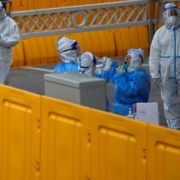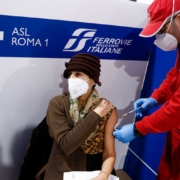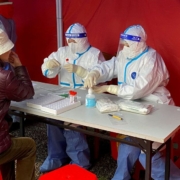The U.S. Food and Drug Administration’s expert advisers will discuss the timing of additional COVID-19 vaccine boosters and the people eligible for the extra shots in a meeting later this week, the health agency said on April 4.
Vaccination after COVID improves immunity; ivermectin fails in major trial
Antiparasitics, Blood Plasma, Children, Convalescent Plasma, CoronaVac (Sinovac Biotech), COVID-19 immunity, COVID-19 Studies, Delta Variant (B.1.617.2; India), Hospitalized COVID-19 Patients, Ivermectin, JAMA Pediatrics, Janssen COVID-19 Vaccine (J&J), Lancet Infectious Diseases, mRNA-1273/Moderna COVID-19 Vaccine (Moderna), Omicron (B.1.1.529) (South Africa), R&D, Therapeutics, Vaxzevria (previously COVID-19 Vaccine AstraZeneca)Although people who recover from COVID-19 usually gain some immune defenses against reinfection, they get additional protection from vaccines, especially against severe disease, according to two studies published on March 31 in The Lancet Infectious Diseases. Additionally, two gold-standard trials published in The New England Journal of Medicine on March 30 help settle questions about two controversial therapies touted by many early in the pandemic with decidedly mixed results – failure for the antiparasite drug ivermectin and success for antibody-rich blood plasma from COVID-19 survivors.
Children ages 5 to 11 who received the Pfizer/BioNTech COVID-19 vaccine were 68% less likely to be hospitalized during the Omicron wave in the United States than unvaccinated children, according to a study published on March 30.
COVID cases in Asia surpass 100 million – Reuters tally
Australia, China, Coronavirus Cases, Coronavirus Disease (COVID-19) Pandemic, Coronavirus Disease 2019 (COVID-19), COVID-19 Deaths, COVID-19 Lockdown Measures, Omicron (B.1.1.529) (South Africa), Omicron BA.2, Reuters Tally, Shanghai, South Korea, VietnamCoronavirus infections in Asia passed 100 million on March 30, according to a Reuters tally, as the region records a resurgence in cases dominated by the BA.2 Omicron sub-variant.
Omicron sub-variant BA.2 accounts for about 55% of COVID variants in U.S. – CDC
Asia, CDC, CDC Guidelines, Coronavirus surge, COVID-19 cases, Dr. Anthony Fauci (Director), Europe, National Institute of Allergy and Infectious Diseases (NIAID), Omicron (B.1.1.529) (South Africa), Omicron BA.2, United StatesThe U.S. national public health agency said on March 29 that the BA.2 sub-variant of Omicron was estimated to account for more than half the coronavirus variants in the country.
Explainer: Omicron ‘stealth’ COVID variant BA.2 now dominant globally
Asia, China, Coronavirus Disease 2019 (COVID-19) Reinfections, COVID-19 transmission, COVID-19 Vaccinations, Europe, Germany, Omicron (B.1.1.529) (South Africa), Omicron BA.2, Public Health Crisis, R&D, Scientists, United Kingdom, United StatesA sub-variant of the highly transmissible Omicron version of coronavirus known as BA.2 is now dominant worldwide, prompting surges in many countries in Europe and Asia and raising concern over the potential for a new wave in the United States.
FDA says current dose of GSK-Vir COVID therapy unlikely to work against BA.2 variant
Bebtelovimab (LY-CoV1404; LY3853113), CDC, Columbia University, COVID-19 Antibodies, COVID-19 treatment pill, FDA, GlaxoSmithKline, Molnupiravir, Omicron (B.1.1.529) (South Africa), Omicron BA.2, Paxlovid, Remdesivir, Sotrovimab, Vir BiotechnologyThe U.S. health regulator said on March 25 the current authorized dose of GlaxoSmithKline and Vir Biotechnology’s COVID-19 antibody therapy is unlikely to be effective against the Omicron BA.2 variant.
Some immune system memory persists year after infection; COVID from Omicron also less severe for pregnant women
Antibodies, China, Coronavirus Infections, COVID-19 Studies, COVID-19 Vaccinations, Doctors, Immune System, JAMA, Omicron (B.1.1.529) (South Africa), Omicron BA.2, Pregnancies, R&D, Texas, The Lancet Microbe, WomenA year after infection with the coronavirus – when antibodies in the blood are barely detectable – the immune system continues to “remember” the virus and should respond to some extent upon re-encountering it, a study from China suggests. According to new research, women who were pregnant during the recent Omicron surge had more than eight times the rate of COVID-19 diagnoses, but lower odds of severe illness compared with pregnant women diagnosed earlier in the pandemic.
Shanghai’s bespoke approach to tackling coronavirus outbreaks is coming under strain as new cases rise in the Chinese metropolis, with authorities reluctant to impose a comprehensive lockdown as other cities have done.
With Robust Results, Moderna to Request Vaccine EUA for Kids Under 6
BNT162b2 (Pfizer and BioNTech), CDC, Children, Clinical Trials, COVID-19 Vaccines, Data, Emergency Use Authorization (EUA), Immunogenicity Data, Moderna, mRNA-1273/Moderna COVID-19 Vaccine (Moderna), Omicron (B.1.1.529) (South Africa), R&DModerna reported positive interim results from the Phase II/III KidCOVE trial of the company’s mRNA COVID-19 vaccine for children six months to under two years and also two to six years of age.

 Reuters Health
Reuters Health







